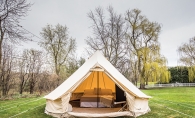“Get outdoors!” we’re told. The benefits of maintaining physical activity are well-documented. So too are the benefits of getting fresh air and strengthening our social connections. Wrap these ideas inside Gore-Tex and Smart Wool and you’ve got yourself a ski racer.
Midwest Race League evolved out of Minnesota Ski Challenge around 1995 and since then, Afton Alps’ ski race teams have grown to accommodate racers nearly every day of the week. Nathan Hakseth, base operations manager at Afton Alps, has been racing for 17 years and says it’s a family affair. “I race with my parents who are in their fifties and my 7-year-old son; racing at Afton Alps is open to any intermediate level or better skier, and we offer a ski race clinic to help new racers get started.” Meet some adventurous participants from Woodbury—ski racers of varying ages and ability who find fun on the slopes.
Taking Up Racing
Christine Farka has skied most of her life but only began ski racing two years ago; she spent 14 years living near Seattle where she did a lot of mountain skiing. “I was stand-offish about skiing in Minnesota because the runs are shorter and allow less time to explore,” Farka says. “I knew I needed to do something different to maintain my enjoyment in the sport.”
Farka decided to take a fundamentals of race clinic at Afton Alps. There she met fellow Woodbury resident Wendy Loudas, who convinced Farka to join the Midwest Race League. “I’m so glad I did,” Farka says. “It’s super fun. It gets me outdoors in the wintertime and is making me a better skier. I handle the terrain better during family ski trips to the mountains and credit my instruction from Afton Alps. I no longer yearn for what I used to have.”
Farka’s inspiration, Loudas, ski raced in high school, and she got back into the sport six years ago. “I enjoy the social piece of it,” Loudas says. “I can go out to Afton Alps on any given day and see somebody I know from racing.”
When asked what is most difficult about ski racing, Loudas says, “There is nothing hard about it. Many people like Christine start racing to improve their regular skiing. The hardest thing is getting over the idea that it’s a big deal because it’s not.”
Turns, Speed and Balance
Skiing takes some athleticism, but it’s made easier with new technology like shaped skies. Racers work on negotiating turns and controlling speed and balance to be as fast as possible without falling. But Hakseth says, “Falling on a race course is okay. It means you’re going for it. And if you make it, you’ll probably get a good time.”
Longtime skier Bruce Bonde began skiing at age 6, but didn’t come to racing until later in life. “I was 52 when I started racing,” Bonde says. “It took only a few lessons to get the hang of it. The hardest part is overcoming the flaws in my technique that prevent me from going faster and still staying in one piece.”
Staying in one piece is important, so Bonde has given up night racing. “My night vision isn’t as good anymore,” he says, “I had a fall during an evening race because I was skiing faster than I could see.” When asked how he might respond to those who think ski racing is too dangerous, Bonde says, “Everything has risks. People don’t get hurt any more often in this sport than playing soccer or basketball. Serious injuries are uncommon.”
Bonde was forced to take last year off from ski racing because of a herniated disc. He got that from shoveling snow. Proof that everything does indeed have its risks.
The Thrill of Competition
John Fitzgerald raced a bit in college and started racing at Afton Alps in 1995. “Skiing is a lifelong activity,” Fitzgerald says. “I skied with my father until he was 78 years old. Racing is just an extra element that satisfies my competitiveness. Racers always want to get a bit faster. It’s you against the clock. That’s what’s nice about it.”
“That’s the essence of it,” Loudas adds. “I know a six-year-old who was one second away from a gold medal. I told him to stay closer to the gates. To not be out ‘picking tulips’ as we say. He got quiet, thought it over, then took off. Sure enough, he got it and was thrilled. What could be better?”
Scott Melander has been ski racing for 28 years. When asked about the level of competitiveness, he says, “It’s hard to set precise time goals because every course is different. I just want to catch the guy in front of me in the standings. Mostly for bragging rights. I also enjoy encouraging others. I love racing because it presents a challenge and makes skiing in Minnesota more fun.”
Fitzgerald agrees. “I’ve seen beginning racers come out and not win but drop their handicap and feel like they’ve won a gold medal. None of us has any fantasy of making the Olympic ski team. We’re just out there to have fun. Having a way to gauge your progress just heightens the enjoyment.”
Loudas says, “Whenever I can close the gap between me and a good racer, I know I’m getting better. But I’ve made mistakes that have cost me time and other racers give me tips on how to improve my speed. We help each other out. I like that.”
Being Active and Having Fun
Everyone must choose his or her winter activities. Ski racers choose to get outdoors instead of sitting on the couch. They get exercise, breathe fresh air, experience nature and build friendships. Racers can put together their own team or Hakseth can place skiers on a team. There is no minimum age. Hakseth simply asks that all minors race with a parent since the post-race awards and social hour for the adult race league take place in the bar. (Afton Alps has a separate junior race league to accommodate skiers ages 5-17).
A banquet caps off the seven-week adult ski race season that runs from January through February, and a highlight video shown offers proof that racing is about having fun. Loudas describes a hilarious section in the video titled “spandex abuse.” She says, “A speed suit can shave half second off your time. But no matter how fast you are, racers can’t take themselves too seriously when wearing a full suit of spandex.”
For more information on Afton Alps ski racing program, go to aftonalps.com









